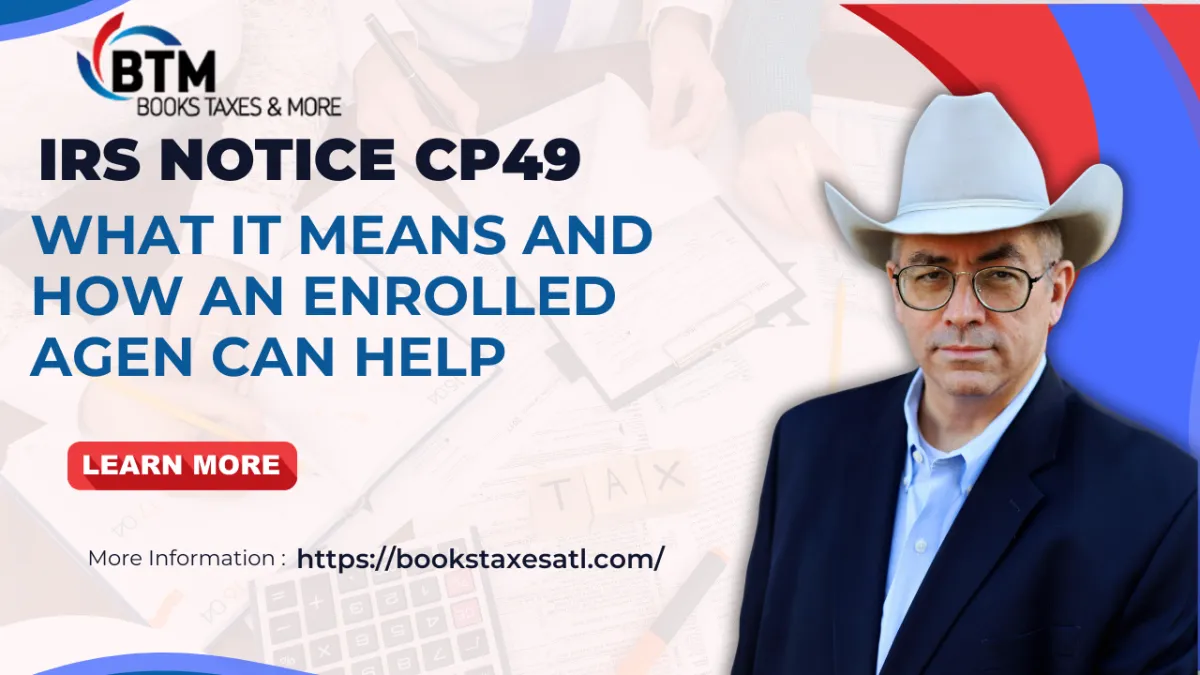
Understanding IRS Notice CP49: What It Means and How an Enrolled Agent Can Help
Receiving a tax refund is usually a welcome event, but sometimes the IRS applies that refund to a prior balance owed rather than issuing a check or direct deposit. When this happens, the taxpayer may receive IRS Notice CP49, which can come as a surprise if the prior balance was unknown or forgotten. Understanding the purpose of this notice, and knowing what options are available, can help reduce confusion and frustration.
What Is IRS Notice CP49?
IRS Notice CP49 informs the taxpayer that the IRS has applied their current-year tax refund to a past-due federal tax liability. Instead of receiving a refund, it has been used to pay all or part of the balance from a previous year.
The notice typically includes:
The original refund amount
The tax year to which the refund was applied
The amount of the past-due debt
Any remaining balance still owed, or the new amount due (if applicable)
It’s important to note that this is not a penalty or a new assessment. The IRS is simply using its legal authority to apply available funds toward unpaid tax debts.
Sample IRS Notice CP49
To better understand the structure and content of a CP49 notice, here's a sample excerpt:
Notice CP49
Tax Year: 2016
Notice Date: January 30, 2017
Social Security Number: xxx-xx-xxxx
We applied your 2016 Form 1040 overpayment to an unpaid balance.
Refund due: $250.00
We applied $500.00 of your 2016 Form 1040 overpayment to an amount owed for 2015. As a result, your refund has been reduced to $250.00.
Summary:
Overpayment for 2016: $750.00
Amount applied to tax owed for 2015: -$500.00
Remaining balance for 2015: $0.00
Refund due: $250.00
This sample illustrates how the IRS communicates the application of your refund to a prior year's tax debt. For a complete view of a CP49 notice, you can refer to the official IRS sample: IRS CP49 Notice Sample (PDF).
Why Did This Happen?
The IRS offsets refunds under the Treasury Offset Program, which allows the government to apply refunds toward outstanding obligations. In the case of Notice CP49, the obligation is federal income tax debt, but in other cases, refunds can also be used to pay child support, student loans, or other federal or state debts.
This can happen even if the taxpayer is currently on a payment plan or has made partial payments in the past. If the debt still exists at the time the refund is issued, the IRS will apply the refund accordingly in much the same way a credit card company applies an payment of more than the minimum to an outstanding balance.
What Are the Options?
Once a taxpayer receives a CP49 notice, there are a few potential courses of action, depending on the situation:
Verify the Debt: Review IRS account transcripts to confirm that the balance owed is accurate. Mistakes do occur, and sometimes a debt has already been paid or reduced without being updated in the system.
Dispute the Offset: If the taxpayer believes the debt was resolved or the refund was wrongly applied, they may submit a dispute. Supporting documentation and clear communication are critical for this process.
Set Up or Review a Payment Plan: If there is still a balance after the refund has been applied, the taxpayer may need to request or adjust an installment agreement.
Request a Hardship Consideration: In limited circumstances, the taxpayer may qualify for special relief, such as Currently Not Collectible (CNC) status, if paying the debt causes severe financial hardship.
How an Enrolled Agent from Books, Taxes & More Can Help
Dealing with a CP49 notice can be confusing, especially if the taxpayer was unaware of a prior debt or does not understand why their refund was reduced. This is where an Enrolled Agent (EA) plays a valuable role.
An Enrolled Agent can assist by:
Reviewing IRS Account Records: EAs have access to IRS transcripts and can verify the accuracy of the debt that led to the refund offset.
Explaining the Notice: They help the taxpayer understand what the notice means, what options are available, and what to expect next.
Filing a Dispute: If appropriate, an EA can file a formal dispute on behalf of the taxpayer, including assembling documentation and managing communication with the IRS.
Negotiating Payment Options: If a balance remains, the EA can help the taxpayer apply for an installment agreement, Offer in Compromise, or hardship status.
Preventing Future Offsets: By addressing the underlying cause of the debt, an EA can help the taxpayer get back into good standing and avoid future refund reductions.
Steve Perry, EA specializes in representing taxpayers in tax controversies.
Final Thoughts
IRS Notice CP49 is a clear message that the IRS has taken action to collect a prior debt by using a current refund. While this can be disappointing, it’s often a sign that past tax matters need attention. Responding with accurate information and a clear plan is key.
Working with an Enrolled Agent ensures that the taxpayer has a knowledgeable advocate who can interpret the notice, address any issues, and help resolve outstanding tax matters efficiently. With professional guidance, taxpayers can take control of their situation and move forward with confidence.
If you need assistance interpreting your CP49 notice or addressing the underlying tax issues, Contact Steve Perry at Books, Taxes & More to guide you through the process and communicate effectively with the IRS on your behalf.
